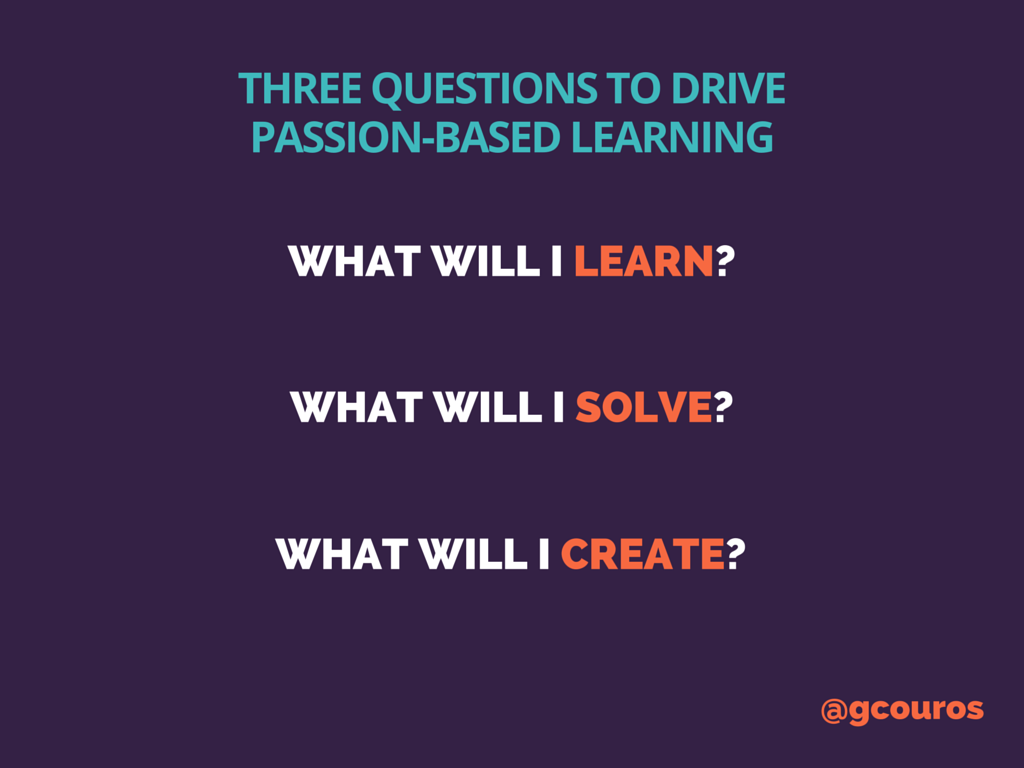What will I learn?
What will I solve?
What will I create?
These three questions are ones that could create some amazing passion based learning opportunities for our students, and help shape them as learners as much or more than any curriculum could in the year. They are not something that you only necessarily have to do answer only once in a year, but they will help to shape some of the learning that your students will create for themselves throughout the year. I will go further into detail on each one.
1. What will I learn?
Years ago, watching John Medina speak, the writer of “Brain Rules“, he shared the idea of the importance of content in learning. He shared the analogy of learning to play the guitar and how basically not knowing how to play the chords would actually lead to simply mimicking playing the air guitar. Our learning of knowledge is important for us to create from it. You may know how to play the chords, but eventually creating music could be the goal. What is important in this process is having the opportunity to learn something that you are interested in.
In Josh Kaufman’s talk on “The First 20 Hours to Learn Anything“, he talks about how we can learn basically how to do anything within 20 hours. You might not be at the top of your field as shared in the notion of “10,000 hours”, (although if you google “10,000 hours” you will find that this might be a myth), but you will have a good understanding of this. a “20 hour project”, could be something where students have the opportunity to learn something that they are interested in, without the pressure of solving the world’s problems. Content is much more engaging to explore when we are actually interested in the topic.
Things that students will need to consider in this opportunity is not only where they will find information but who will teach them? This could give students the opportunity to learn to network and connect with others to help share ideas that they want to learn about. This could create some very powerful learning opportunities for our students.
2. What will I solve?
Ewan McIntosh’s thoughts on “Problem Finders” has long been pushing my thinking not only for education, but innovation. In his post, he shares the following idea on the topic:
Currently, the world’s education systems are crazy about problem-based learning, but they’re obsessed with the wrong bit of it. While everyone looks at how we could help young people become better problem-solvers, we’re not thinking how we could create a generation of problem finders.
Thinking about this, students could look at problems that they can find within the school, local, or even global community, and share how they have solved it. Sharing ideas such as “capstone projects”, where students pose a problem that they are trying to solve and then share how they learned it, could be a powerful way to really influence not only innovation and entrepreneurship in our students, but also help them to develop empathy for others. Whey they have the chance to try and see problems from the perspective of others, that does not help them develop as learners, but also as better people.
3. What will I create?
Will Richardson shared a quote from Gary Stager regarding “making across the curriculum“:
“When school leaders tell me “our school is building a $25 million Makerspace,” I am concerned that Makerspaces may exacerbate educational iniquity. While there are expensive pieces of hardware that may need to be secured, I want the bulk of making to permeate every corner of a school building and every minute of the school day. Teachers whose Makerspace is in a few cardboard boxes are doing brilliant work. Making across the curriculum means students as novelists, mathematicians, historians, composers, artists, engineers–rather than being the recipient of instruction.” Gary Stager
With this in mind, students should have the opportunity to create something of interest to them, and share that process. This could be in any field, whether it is inventing a process or product, composing music, developing a health initiative, or writing a novel. This is an opportunity for a student to develop the “Innovator’s Mindset“, and go much deeper than learning, but going to where the magic happens in creation.
If we embraced and worked with our students on these three questions, it would be amazing to watch them develop as learners. What would be crucial in all three of these questions is the opportunity to constantly reflect on each one throughout the year and have opportunities to create documentation which would not only create evidence of learning, but show growth over time. This could be done through audio, video, written, or whatever the student felt comfortable with, but there would definitely be a benefit in the reflections being accessible to more than simply the teacher.
There would be lots of logistics in creating opportunities for these three opportunities to come to life, and as educators, that it is why it is imperative to be innovators ourselves. We will have to take what we work with, and create opportunities for our students where learning is truly meaningful and powerful for them; great teachers find a way.
